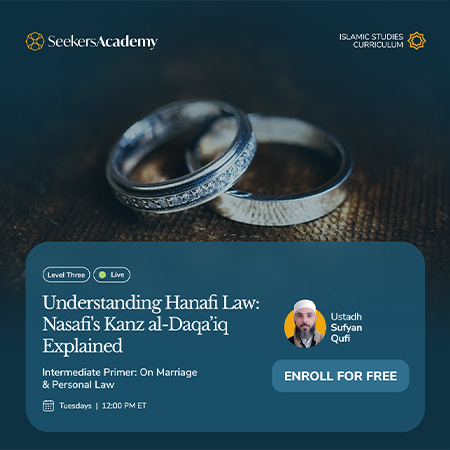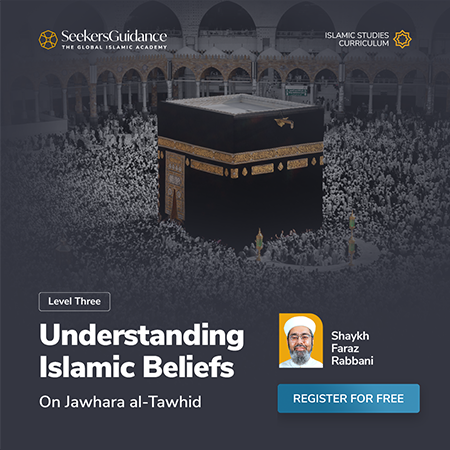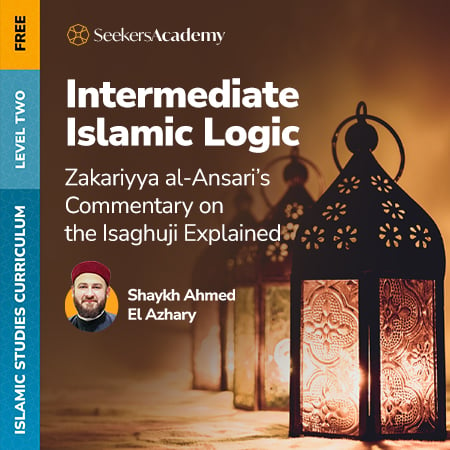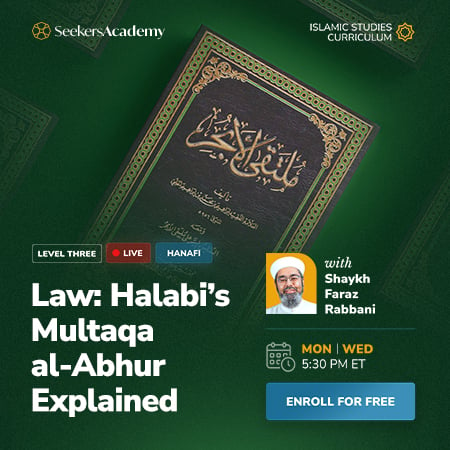
This is a Level Three course in the Islamic Studies Curriculum.
This course is based on the Kanz al-Daqa’iq of Imam ‘Abdullah ibn Ahmad ibn Mahmud al-Nasafi. The Kanz is one of the most important and influential works in the Hanafi school and is considered its most fundamental primer.
This course serves to provide a proper understanding of the Islamic rulings of Personal Law. Shaykh Faraz Rabbani covers the chapters on Marriage and Divorce, the Waiting Period, Maintenance, Penal Punishments, Warfare, Lost and Found, Partnerships, and more.
Topics covered include when marriage is required, sunna, or even prohibited; the integrals and conditions of the marriage, and whom it is valid to marry. In addition, the rulings of divorce are outlined, detailing the cases of when it occurs, and the scenarios of its being binding or revocable.
This course also covers issues of punishments and war, highlighting the deep wisdoms of the revealed set of ethics and laws we have through the Sacred Law for the integrity and ultimate success of human society.
This class builds on previous foundations and is not a class for beginners. It presupposes a previous study of Islamic Law (fiqh) and other supporting sciences.
- Teacher: Shaykh Faraz Rabbani
Imam Abdullah ibn Ahmad ibn Mahmud al-Nasafi was among the greatest Hanafi imams of his time, hailing from Nasaf in modern-day Uzbekistan. He authored major contributions in Hanafi law (fiqh), legal theory (usul al-fiqh), tenets of faith (‘aqida), and exegesis (tafsir).
It is related that when Imam Nasafi intended to write a commentary on the Hidaya, the crown jewel of the Hanafi school, a great scholar - Taj al-Shari‘a, heard of Imam Nasafi’s intention and said, “This [writing a commentary on the Hidaya], does not befit his stature.”
Hearing this, Imam Nasafi instead wrote a work to rival the Hidaya, the Wafi, and then commented on it, the Kafi — and it was as if Imam Nasafi wrote a great commentary on the Hidaya! Imam Nasafi then summarized his Wafi into a very terse and very precise work, the Kanz.
His work in legal theory, al-Manar, is a foundational work in the Hanafi school with many great commentaries written on it, such as Kashf al-Asrar, Nur al-Anwar (which has the marginalia Qamr al-Aqmar), Fath al-Ghaffar, Ifada al-Anwar (which has the marginalia by Ibn ‘Abidin called Nasamat al-Ashar) and more.
He is also renowned outside the school, particularly for his Quranic exegesis, Madarik al-Tanzil.
He died in 710 AH / 1299 CE in Baghdad.
- This is an intermediate level class in Hanafi Fiqh (Level Three) of the Seekers Islamic Studies Curriculum.
- Students are expected to have completed the equivalent of the Level One and Two requirements in Hanafi fiqh–such as having completed Quduri’s Mukhtasar, or Mawsili’s Mukhtar under a teacher.
- For students without this, we recommend that they begin with Level One, then Level Two of The Islamic Studies
- It is particularly beneficial for advanced students of Hanafi Law
- It is a Level Three course. In order to successfully complete this course, students should either take the Mukhtasar al-Quduri course or the Mukhtar al-Mawsili course.
- This course can also be taken by anyone who is interested in supplementing their understanding of advanced Hanafi Law.
- Understand the core rulings related to marriage.
- Appreciate the wisdom and purpose of these legal rulings.
- Explain the legal reasoning and methodology used in the Hanafi school.
- Contextualize the practical implementation of Divine Guidance.
- Appreciate the wisdom of the laws revealed for us
- Conceptualize the gravity of the rights of others


